- Home
- Roxane Gay
The Best American Short Stories 2018 Page 36
The Best American Short Stories 2018 Read online
Page 36
We, the Guo family, insist that the eucalyptus tree where our daughter Rebecca died be cut down. It is too much to bear for us to see the reminder of her terrible death, or to even know that it is there.
Mr. and Mrs. Guo came to me to write the letter because they wanted it to be written in perfect English, which they could not do themselves. It was the kind of thing, I knew, that they would have had Becky do, had she lived. Because I wrote this letter for them I know that they did not ask for a plaque to be installed at the site of her death; they believed without question that the town would deny them such a thing, and I too knew this and agreed with them without a word spoken.
They came to our apartment in the afternoon, when neither of my parents were home, and asked me to write this letter to the mayor of Polk Valley. I had never before seen Mr. Guo so rumpled, or Mrs. Guo so casual—my life had carried enough weight by then, but I’d never seen two people so heavy with sadness.
When they asked if I would please do this favor for them I was immediately embarrassed because I knew they would want me to write the letter on a computer, which my family did not have, but the couple before me was bent with such sorrow that I said yes and let them inside, mentally scanning the disarray in our tepid home. I could tell that they were trying not to see Becky in me, but that they couldn’t help doing so. I look nothing like Becky—she was round-faced, had enviable double eyelids—and yet the comparison was inevitable and caused their eyes to snag on me before ripping away. I gestured to the kitchen table and asked if they wanted tea, but they were staring into emptiness. I asked again in Mandarin, and Mrs. Guo’s head lifted slightly.
“You can speak Mandarin?” she asked, in Mandarin.
“Hai hao,” I said, which was to say, “My Mandarin is serviceable, but I’m by no means fluent.”
“We tried to teach Becky, but she only ever spoke English,” Mrs. Guo said in English.
I went to the kitchen and searched for tea, vaguely aware that we had run out the day before and that I hadn’t asked my parents for the money to buy some. I told the Guos with apology that we had run out of tea, but did they want some water? With enough mundane dillydallying my heart would stop drumming, I thought. Nor did I know why I was so afraid, though in hindsight I think it was because they emanated grief like a contagion.
Mr. Guo tried to pay me after I gave him the letter, and even though I had no money and my parents were always talking about how hard they worked and how poor we were, I refused the twenty-dollar bill. But for hours after they left, the apartment smelled like death: pale and blank, dry like dead leaves. I opened all the windows and turned on all the fans for fifteen minutes, and then I went through the apartment and turned them all off, but I left the windows open. It was summer and I could hear people talking and laughing and carrying on while I went into my bedroom and did my calculus homework, and the Guos went home and, I am sure, painstakingly rewrote my letter on their computer before sending it to our mayor. I wondered whether I should have taken the money. I decided that I was right not to.
After the crime-scene tape was removed, I would go to the eucalyptus tree and press my hands against the bark, feeling its warmth beneath my palms and knowing that it was breathing, a living thing; each time I returned I half-expected it to be nothing but a stump, but there it remained, its leaves rustling, its branches looming to remind me of all the corpses that could still hang there.
At the time there were always two or three bouquets at the base of the tree—red roses, calla lilies. I would bring flowers sometimes, when I remembered. I imagine there are no flowers left there now. I no longer go to the tree, and I avoid the Guos when I can. It seems heartless, but if I must stay and care for my mother it is important that I distance myself from Becky, because we still don’t know who killed her, and if I remain too close to the situation I will corrode from fear.
“Electroconvulsive therapy,” Dr. Richards says, “is extremely effective for those with intractable depression. It has rarely been shown to work well for those with schizophrenia. I usually recommend ECT for the former, and not so much for the latter, because of the potential for undesirable side effects. Memory loss is the greatest side effect, as you’ve probably heard. I’m sure you’ve looked it up. There are those who advocate against ECT because of what they’ve gone through. I don’t blame them for it; they are entitled to their experiences. But there are some cases of schizophrenia in which I do think ECT should be considered, and yours is one of them. ECT is most effective for people who have been diagnosed with schizophrenia and experience hallucinations—in your case, auditory and visual hallucinations—yet don’t respond to the atypical antipsychotics, Clozaril, or even the older antipsychotics. For people like you, Wendy, ECT might shake up your brain enough to get things working right again.”
I am trying not to look at his face, focusing only on the words coming out of it. I am a good candidate for ECT. My health insurance would cover the treatment. I would be an inpatient at the hospital for approximately one week and receive electroconvulsive therapy each morning. They can best monitor me this way. I might be able to go back to work.
“The Wheel of Fortune is a reminder of the impermanence of life,” says a neutral voice.
“I need to talk about this with my husband before I agree to anything,” I say.
“The roots of the word ‘innocent’ mean to be free of injury or hurt.”
“That’s fine,” says Dr. Richards, looking back at his computer.
The bus ride back to Polk Valley takes an hour, and the line at the polling place is long, yawning down the perimeter of the high school and around the sidewalk to the corner, across the street from a convenience store that sells cigarettes to minors and Slim Jims at the counter. I wait between a twenty-something white guy scrolling through his phone and an older white woman scuffing the toes of her red cowboy boots. I don’t talk to them about who they’re going to vote for; I remind myself that California always goes blue.
I can’t, said Becky, I’ve died way over there.
I text Dennis: “Consult went okay. Dr. says I should do it. Insurance will probably cover.”
In two minutes he texts back: “Let’s talk when I get home.”
I look briefly at Twitter and see that the man I am afraid will become president has insinuated that it would be best if his supporters harassed people at the polls, particularly people of color; of course, he never says “people of color,” but we know what he means. I click on the tweet and scroll down; the woman who shared this article received fifteen misspelled and angry replies from people with names like WhitelsRight19887 and ((Aryan Queen)). “Muslim Obama HATES America, LOVES terrrerists!” ((Aryan Queen)) is using a photo of Taylor Swift as her avatar. My coworker at the deli used to blast Red while we cleaned the kitchen, singing, “Don’t you see the starlight, starlight? Don’t you dream impossible things?”
When I go to sign in at the polls I see that Mrs. Guo is one of the women at the table, which surprises me; I have never thought of her as someone to volunteer for anything, but perhaps I am mostly thinking of my own mother, who felt that to volunteer in Polk Valley was to extend herself too far into America. I haven’t spoken to Mrs. Guo in years, but she beckons me forth, a lipsticked smile blooming. Her hair is short and permed, puffy like a cloud. She says, “Wendy-ah.”
“Hi.”
“Can I see your ID?”
“Yes.” I remove it from my wallet. She takes it and scans the names in front of her. “Voting today. Good girl,” she says. “You are still so beautiful.”
“Thank you.”
“Are you married yet?”
“Um,” I say, “yes. I am.” I think of Dennis, his image slotting neatly into my mind. “I got married last year.”
“That’s good,” Mrs. Guo says. She makes a mark with her pen. “Mr. Guo and I are moving to San Francisco. We’re leaving in a month.”
I don’t know what to say to that.
“We never forgot . . .
Mr. Guo and I are always grateful that you wrote that letter for us.”
“It was nothing, really.”
“No,” she says, “it was a kindness. A true kindness.”
“I’m sorry it didn’t work out,” I said.
“Mei you guanxi.” She gestures to an empty voting booth, and says, “You take care, Wendy,” as I walk away.
After her body was found, and even after it was clear that suicide was an impossible explanation, there remained a contingent that insisted Becky must have killed herself. Such a strange girl, with such dark thoughts—no surprise that she had ended up dangling from a tree. And yet Becky was strange in the most conventional of ways: a Sex Pistols pin on her JanSport, a streak of hair the color of holly berries. Witchcraft or Satanic practices could explain the otherwise physical impossibility of how, but I bristled at such associations, which only accelerated Becky’s inevitable mythology. Becky could be anything, once she died, and the rest of us would have to live.
I used to avoid being in the same room as Becky. It was too much to have two Chinese girls in one place, I thought, and Becky must have felt the same way because she often entered a room, spotted me, and then backed out to find her own domain. Usually this happened at parties. Sometimes it happened at restaurants. Once at a museum: a gallery of watercolors that looked like wounds.
After she died, of course, this was no longer the case. Now I find myself wanting to talk to her. I want to ask, Are you scared, too? Even knowing that I am not alone would be its own strange balm.
Dennis and I own a television, but we use it primarily for movies and his video games, and only recently activated the free cable that comes with our internet connection. I have, till now, resisted watching the breakneck election coverage, but it is already on when I get home. I find Dennis sitting in the corduroy easy chair, checking his phone with the television glowing and muttering across the room; I kiss him and put down my bag and stretch out on the sofa, staring at the ceiling. Right now, the news anchor says, the electoral votes are 129 to 97, which seems impossible—it was not so long ago that the candidate was thought too volatile to even win a primary.
“How was the consult?” he asks.
I had almost forgotten the consult. “It was okay.”
We are silent. Polls are now closed in forty states.
“Do you think you’ll do it?”
“I’m not sure.”
He asks, “Are you scared?” I wish I could see his face, but I imagine it: Dennis with his bespectacled eyes on his phone, performing the act of emotional multitasking. While I’ve been psychotic, he’s been phone banking. He even went canvassing door-to-door, which sounds nightmarish to me—but Dennis is white and male and good-looking without being threatening—I never use the word disarming, but he is that, too.
“I read a book about ECT earlier this week. In the worst-case scenario, I won’t remember major events in my life. I might even have trouble forming new memories. They don’t even know how ECT works—a guy named Ugo Cerletti decided to use electricity on the brain because they thought epilepsy and schizophrenia were somehow antagonistic. Before ECT, they’d use camphor to induce convulsions, but camphor never became as popular as shock therapy.”
“What are the odds you’ll have memory loss?”
“I don’t have hard numbers. I don’t know if there are any. It’s something that might happen. I would have to make peace with that.”
“When do you have to decide?”
“Soon, I guess.” I realize I’m drawing a red X on my thigh with the nail of my right index finger. “I know Dr. Hoch wants to get me on the wait list as soon as possible, if I’m going to do it.”
Dennis says that it’s my decision and that he’ll support me no matter what, which is kind and supportive and the right thing to say.
I look at Twitter again. Everyone is talking about the election, about moving to Canada, about the apocalypse. A Canadian writer says, “The grass is always greener!” The Southern Poverty Law Center is still reporting election-related hate crimes. One friend is live-tweeting her experience of watching Casablanca for the first time. “Does anyone else think Humphrey Bogart looks like J. D. Salinger?” she asks. I read an article about people chanting “Lock her up!” at a rally. I read about a Muslim schoolteacher in New York City who had her hijab torn off by a stranger in broad daylight. (“MCM LIES,” is one reply.) I read about gaslighting. I read an essay about having a younger brother with brain cancer, and I start to cry even though I don’t have any siblings and no one I know is dying.
“Oh my God, Florida,” Dennis says. “He just took Florida.”
I look at the TV through wet eyes, where his fleshy, grinning face appears with the words FLORIDA and 29 ELECTORAL VOTES. He has won. No one has conceded yet, but still, he has won.
I’m here, said Becky.
“It’s over,” I say.
Dennis says, “I think so.”
I tell him that I’m going to bed. He says something back.
In the bathroom, where I avoid looking in the mirror—an aversion to my own face is one of my latest symptoms—I turn on the tap and let the water run cool over my fingers. I stand at the sink for a long time, until I cannot remember what I am doing; I lose the next move. Suddenly, and too loudly, a girl calls my name.
Contributors’ Notes
MARIA ANDERSON’s fiction is forthcoming or has appeared in the Mississippi Review, the Missouri Review, the Iowa Review, and the Atlas Review. She’s an editor at Essay Press, and she has been awarded residencies from Joshua Tree National Park, the AMK Ranch Research Center in Grand Teton National Park, and the Crosshatch Center for Art & Ecology. She lives in Bozeman, Montana.
■ I lived in Missoula, Montana, for a short time and had always been fascinated by Bonner, the tiny town a couple miles east on the interstate where a few of our friends lived. I wanted to set a story there. I grew up on a cattle ranch outside of town, and spent a lot of time alone as a child, wandering through the woods with our German shepherd. I wanted to work through some of the feelings that go with this kind of deep-seated physical and emotional isolation.
I wrote the first draft of this story at Coal Creek Tap while doing my MFA in Laramie, at the University of Wyoming. It felt easier to focus with people drinking beer and playing cribbage around me. My early readers will remember several especially awful middles and endings to this story—a scene in a strip club with a dancer named Anaconda, a moment in a hotel where men attempt to steal dog semen from a fridge. But what I kept returning to was the main character, and how it feels to have a loved one vanish, whether emotionally or physically, and to know that this is one of the old mysteries you hear about. Someone is there one moment and irreversibly gone the next. Even if that person is right in front of you, you can feel the horror of having lost them already. The horror isn’t that they’re gone, but that this vanishing is unfair and unexplainable.
JAMEL BRINKLEY is the author of A Lucky Man: Stories. His fiction has appeared in A Public Space, Ploughshares, Gulf Coast, Glimmer Train, American Short Fiction, Threepenny Review, Epiphany, and LitMag. He has received scholarships and fellowships from Kimbilio Fiction, the Callaloo Creative Writing Workshop, the Napa Valley Writers’ Conference, Tin House, Ragdale, and the Bread Loaf Writers’ Conference. A graduate of the Iowa Writers’ Workshop, he was also the 2016–17 Carol Houck Smith Fiction Fellow at the Wisconsin Institute for Creative Writing. He is currently a 2018–20 Wallace Stegner Fellow in Fiction at Stanford University.
■ As I worked on the initial draft of “A Family,” I had a few stories swimming around in my mind: “Old Boys, Old Girls” by Edward P. Jones, “Three People” by William Trevor, and the brilliant reply to that Trevor tale, “Gold Boy, Emerald Girl” by Yiyun Li. In addition to those stories, I was, as I came to discover along the way, also thinking about black men and mass incarceration, a changing New York City, the urgency and variety of human companionship, the way a friend can be the love of on
e’s life, the multiple forms that families can take, and both the speed and stickiness of time. My first working title was “Lena’s Men,” which I’m still fond of in many ways. She’s my favorite person in the piece, the story’s true living link, connecting each of the other principal characters. I decided against that title, ultimately, because I wanted to emphasize all the characters together as one unit, even on the level of grammar. The next working title was “A Kind of Family,” but I decided against that one because I wanted to avoid any unconscious or deliberate misinterpretation on the part of some readers (in, say, the tradition of the Moynihan Report) that I was writing about kind of a family or sort of a family, not quite a family, a family only in degraded form. The title I settled on asserts, simply and directly, what I believe to be true about these characters in the end, who and what they are with one another.
YOON CHOI lives in Anaheim Hills, California, with her husband and four children. Her work has been published in Michigan Quarterly Review and New England Review. A current Wallace Stegner Fellow at Stanford University, she is working on a collection of short stories.
■ This story began as a promise to myself, after the last of our children was born, to find an hour a day to write. What I came up with in those hours was perfunctory at best. An old man with Alzheimer’s wanders from home and drowns in a municipal pond. Six thousand words, tops. But one night, as I was typing toward the inevitable, it occurred to me that the old man would probably have a wife. The wife gave me the structure of the story—and then the story itself. Structurally, the use of his/her sections solved the problem of narrating from a single unreliable perspective. But the double narration also raised questions. There was a wife. This probably meant there were children. Maybe even grandchildren. A grandchild in particular. I thought: What if the old man was left alone with his grandson? What if he brought that child to the edge of the water? What if the old woman had left the two of them together, against her better judgment, because of . . . what? A secret. Suddenly, I was not so sure that the old man would be the one to die. I was not sure about anything at all. That’s when the story found in these pages slowly began to get written.

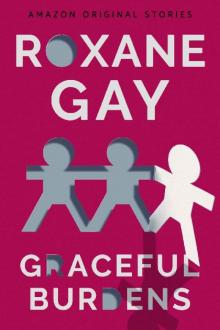 Graceful Burdens (Out of Line collection)
Graceful Burdens (Out of Line collection)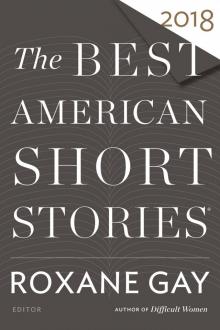 The Best American Short Stories 2018
The Best American Short Stories 2018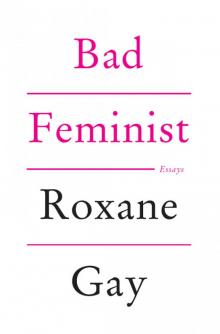 Bad Feminist
Bad Feminist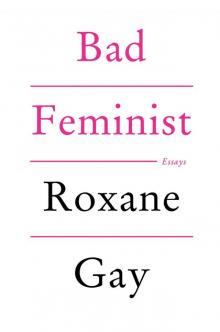 Bad Feminist: Essays
Bad Feminist: Essays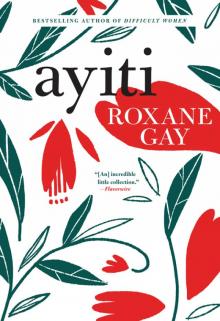 Ayiti
Ayiti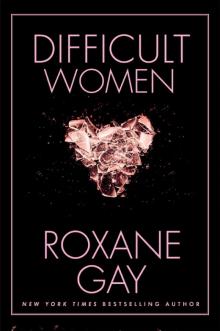 Difficult Women
Difficult Women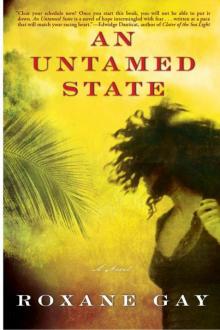 An Untamed State
An Untamed State Hunger
Hunger